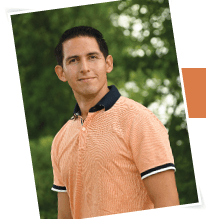 Patient Story
Patient StoryDon’t Give Up on Your Diagnosis
Bryant Ponce hopes that his experience with type 2 achalasia will encourage others with rare conditions to advocate for themselves in medical care.
At 29, the New Jersey resident developed acid reflux and difficulty swallowing, particularly when drinking sodas and eating spicy foods. Eventually, he struggled with even bland foods and drinks like yogurt, milk, cereal, and water. By the time he started skipping meals, Bryant knew that something was deeply wrong with his health. “When I told my gastroenterologist how much weight I had lost in the previous six months, he referred me to Dr. Sherman for additional testing,” Bryant says. “I had heard about The Bloodless Institute from a friend, who shared with me how people came from all over the world to access bloodless care. Because bloodless medicine is important to me, I was glad to have this type of care nearby.”
An Incredibly Rare Condition
After an endoscopy and many other tests, Bryant was diagnosed with type 2 achalasia, an esophagus malfunction in which food has a hard time emptying into the stomach. A rare disease, achalasia is only diagnosed in one person in 100,000 worldwide. Bryant was in the right hands with Jingjing Sherman, MD, general surgeon with The Bloodless Institute at Englewood Health. She assured him that his treatment could be done without a blood transfusion. “The symptoms can be managed with a Heller myotomy,” Dr. Sherman says. “This procedure involves making five small incisions and using minimally invasive techniques to cut the esophagus muscles enough to relieve pressure.”
An Individualized Solution
Dr. Sherman and her partner, general surgeon Celinés Morales-Ribeiro, MD, performed a myotomy and a procedure to reduce Bryant’s acid reflux symptoms. Thanks to the success of the surgery, Bryant has returned to his active life, hiking, swimming, and doing outdoor photography—and he can eat pretty much whatever he wants. “Listen to your body, collaborate with providers, and do your own research,” Bryant says. “I remember noticing a difference within the first month or two, and I was soon in a good mood because I was finally eating like a normal person again.”